#golden halo
Explore tagged Tumblr posts
Text
Murals in DAI: The Death of a Titan

This mural is found in an Unknown Ruin, which location is unknown. We have access to it via a blocked Eluvian in the Deep Roads.
[This post is part of the series “ Murals in DAI ”]
[Index page of Dragon Age Lore]
On the titan’s body, we find a veilfire rune that triggers the codex Veilfire Runes in the Deep Roads. I already worked on some interpretations of it in Ancient Elven codices; Vir Dirthara. If we read the codex while observing this image, and assuming that both of them describe the same event, we can conclude that the mural is narrating the codex in “three panels”: The elvhen attack, the death of the Titan, and the “something else”.
The codex, for a quick review:
In the light of the veilfire, the runes seem to shift, coiling and uncoiling like snakes. A thunderous voice shatters the stillness, shouting: "Hail Mythal, adjudicator and savior! She has struck down the pillars of the earth and rendered their demesne unto the People! Praise her name forever!"
For a moment, the scent of blood fills the air, and there is a vivid image of green vines growing and enveloping a sphere of fire. The vision grows dark. An aeon seems to pass. Then the runes crackle, as if filled with an angry energy. A new vision appears: elves collapsing caverns, sealing the Deep Roads with stone and magic. Terror, heart-pounding, ice-cold, as the last of the spells is cast. A voice whispers: "What the Evanuris in their greed could unleash would end us all. Let this place be forgotten. Let no one wake its anger. The People must rise before their false gods destroy them all."
The attack

According to the codex, the elvhen on the left could be Mythal. Her cape/cloak is made of “green/emerald water” which is usually the description we have of the Fade, which was once the kingdom of the elvhen and spirits. This part of the mural seems to imply “elvhen from the Fade used a god-like power to attack a titan”. I assume the god-like power because the elvhen is casting a circle of gold in her hand, which is a colour that we have seen used a lot to represent god-related iconography and decoration.
We also know that Mythal was different and special from all the rest of the Evanuris. This idea is given to us not only because her statue always is present in all the Temples we visited [included Dirthamen’s], more often than not in a central place or in a place of importance. We also saw that, from all the Evanuris, she is the only one with a divinity halo behind her in the mosaic series [check it in Evanuris]. So, one can assume her power was far over the rest of the Evanuris, so she has a good probability of killing a titan. In any case, this elvhen could represent any Evanuris anyway, but again, I’m also working in relating this mural to the codex.
The Death of a Titan
Then, the next “panel” would be the way in which the Titan was killed

In the centre we can see an undeniable humanoid figure that has been attacked. It’s made of a brown colour, giving the idea of an earthy creature. Its dimensions are so big that it does not fit completely in the sphere. It is the titan. It has an eye drawn on it. This particular kind of eye has been seen in the murals “Self-Portrait” or in the “Removal of the Vallaslin”, which gives us the confirmation this is an eye in the fresco elven style [if we had any doubt].
The body of the creature has been cut in two, across its heart/core. The heart has the asterisk symbol surrounded by a “halo” of gold [or it can also be understood as a Golden Ring]. Once more, we can see that the figure of a golden halo, or gold sphere or gold ring may be implying “Divinity”-like power and control. We also need to remember that in DA lore, divinity has been set as something related to the amount of power that a creature has instead of a particular nature [Solas’s and Morrigan’s words].

Around the golden halo wrapping its heart, we see a fading glow of green. This colour matches the “emerald waters” of the figure on the left, so it’s a colour related to the Fade: this may imply a relationship between the heart of a Titan and the Fade [could this be related to the codex Vir Dirthara: The Deepest Fade, where the skills to reach the deepest Fade are described very titan-dwarvish-like?] The interpretation of the heart needs a whole section apart.

The titan’s head has been removed. The cut in its “neck” seems clean, while the side of the head is “blasted” which may imply that it was affected mentally. Thanks to Cole’s lines along Overlook, Excavated Caves, and Lower Walkways, we know the Titan has been removed of its will, it is sleeping, unable to awake, as the elvhen mined its body and did something with its heart.

The creature is surrounded by blue lines which branch shape represents lyrium veins. All are drawn in a radial way, with its heart as the central origin of all these extensions: we are seeing the Titan’s circulatory system.

The colour of this sphere where the Titan is trapped is coloured in red. On the bottom we see a bit of orange, giving the idea of fire. This is the “fire sphere” that the codex speaks about. So the fire sphere is about something done to a titan, that angered it, and produced something terrible that had to be hidden later and avoid “its wake”.
Titan’s Heart

The interpretation of the heart of a Titan and the elvhen orbs is very complex and vague. It requires some lore details first that seem to be unrelated:
The Elvhen Orbs
The Elvhen orbs have been shown in these murals represented by the asterisk symbol. This symbol has also appeared in the ground yellow mosaic, in the centre of what seems to be related to a sun surrounded by four eluvians/Mythal dragon shaped Gates:


It’s the same asterisk made of eight “rays”.
Tevinter co-opted [or maybe were taught?] about these orbs before the time of the magisterium and the Old Gods. The Tevinter orbs, called somnaborium, are translated as “vessels of dreams”.
Dorian: That orb Corypheus carries... are you certain it's of elven origin, Solas? Solas: I believe so. Why do you ask? Dorian: There are paintings in the Magisterium's archives of men holding similar orbs. They were depictions of a time long before the magisters. The ancient Dreamers, perhaps. The texts called those orbs "somnaborium"--"vessels of dreams." Could they be the same thing? Solas: Perhaps. The humans of ancient times took much from the elves. Dorian: And Corypheus isn't far removed from the time. Hmm.
These Tevinters that Dorian refers to may be the same ones related to the Astrariums. They seemed to have had a deeper relationship with Elvhenan culture. They also had interest in the constellations and the astronomy of Thedas in general, which originally had a lot more of elvhenan representation. This brings a lot of unanswered questions about this particular ancient group of Tevinters and the posterior Magisters Sidereal [title related to celestial bodies and constellations].
The “vessels of dreams” can easily be interpreted as “vessels of Fade energy”, the same energy we saw in the codex Raising the Sonallium, which allowed the creation of worlds. Now, this brings a question: is this energy infinite? What’s its source? Is it merely Fade? If the elvhenan created worlds from it, is this not an energy that seems to have “shaper/titan” properties? In codices like Attentive Listeners or Homecoming, we see that the main power of the elvhen is to bend what already exists, not to create.
I always questioned the real reason why the architects are fighting in Raising the Sonallium. I think it may be related to some unethical procedure in the creation of the world, or a question about the use of the energy of the Fade for this kind of useless creations. We know it cannot be about an aesthetic colour choice.
Sadly, there are no many other sources to explore this train of thoughts, but certainly the idea that the Fade energy may be provided by the Titans themselves would have terrible in-lore consequences if it’s true: it would mean that the elvhenan kingdom was just the typical story of the created creature taking the power of their creators, rebelling against them, and abusing of the original power.
Anyways, continuing with the orbs: through the analysis of Fen’Harel’s orb, we know that the main function of these orbs is to accumulate Fade energy, which is used to the creation of worlds. Solas tells us at the end of Trespasser that he slumbered during a millennia while his orb kept accumulating energy that would allow him to destroy the Veil again.

We don’t know the origin and construction of these orbs, but we know there were many during the time of the Evanuris. In the Shattered Library we even find several of them, empty, spread at the borders of the Lower Archives. Why are they not accumulating energy? What process has been broken that the accumulation function has stopped working in them? These seem to be discharged or useless. Maybe the accumulation of energy needs of someone directing that energy?
These orbs also seem to be used in the procedures of creating pools such as the Well of Sorrow, through which the bound process of the servants of a given Evanuris is executed, according to the mural Removal of the Vallaslin:

So, when we connect the elven orb with the asterisk symbol, the mural of “The Dead of a Titan” can be understood in three different ways:
1) The Creation of the Elvhen Orbs is made out of the Hearts of Titans.
We can think that these orbs are made of “extracted” Titan’s hearts. So, when the Evanuris won the war against the Titans, they took their hearts to create these orbs and the rest of their bodies were mined in order to obtain their lyrium to potentiate magic and to perform vallaslin slavery-rituals.
Pros of this idea
Titans are always spoken in plural, meaning that there were many of them and since some codex speak of “pillars of earth” and some victories over then were attributed to Elgar’nan too [Vir Dirthara: Signs of Victory ], it seems that some kind of harvesting may have been possible in order to create several elvhen orbs.
This concept allows the speculation that the red lyrium is Blighted lyrium even though we were hinted in books [The Calling] and in games [Uncharted Abyss] that some parts below the Deep Roads, potentially related to the interior of the Titan, are immune to the Blight and reject the darkspawn: it seems reasonable to think that while the heart exists, the lyrium in the veins is purified through a “circulatory system”, so we can find places likes the Uncharted Abyss where there is no Blight nor darkspawn. But once the heart is removed or dead, and the remaining lyrium gets stationary, the possibility of being blighted does not contradict the apparent immunity to the Blight that places like these seem to have.
Cons of this idea
Size. I bet a titan’s heart is too big to compress it into that small ball that we see in the elvhen’s hands. Note: remember that the heart we saw in the DLC was not a Titan’s, it was a Guardian. Even the wikipedia of Dragon Age has that information wrongly [check The Wellspring].
If we assume Occam’s razor, there is no much sense in thinking a living creature could stay alive without their heart. Besides, there is no lore that states what happens with a titan once their heart is removed. Is it still alive? Is it dead? Is it in permanent sleep? According to Cole, the Titan is still singing and sleeping, which seems to contradict the idea of “removing heart”=“death of a titan”. Two possibilities arise if we assume Cole is the one who holds the truth: Or removing the titan’s heart removes their consciousness but keeps them alive; or the heart was never removed.
The only hint we have of a creature without a heart that still lived is the Tale of the Avvar about Korth the Mountain-Father. But he not only kept alive, he became cruel and violent. This image would fit an “angry titan” too, though. Was this tale shared with the Avvar via the spirits to represent what the Elvhenan did ages ago to a Titan? Hard to say for sure.
2) With the power of the elvhen orbs, the Titans were killed, including their hearts.
This idea brings similar consequences from the point 1. The difference lays that it does not make use of the heart of the Titan, and uses the concept that the Titan is killed in the process.
Pro of this idea
Similar to the previous interpretation. It solves the problem of keeping the size of the heart into consideration as well as a potential “life” after the heart is removed. We assume in this option that the titan is completely killed.
This idea allows the concept of accepting that a titan dead body can be susceptible of being tainted, potentially giving the explanation of the origin of red lyrium as part of the procedure of decay and rotting of a titan’s corpse.
Cons of this idea
This is a good interpretation of the Mural we are seeing, but the cons are similar to the previous one: Cole keeps telling us that the Titans are alive, but in a vegetative state, sleeping, unable to awake because they forgot how to do it. So, the titan doesn’t seem to be dead. This argument is so strong that I would say that the whole idea of the point 2 should be discarded. The Titans are sleeping, stirring with big Fade-related events, and singing. Their minds seem to be trapped, but they are very much alive. We even can bring into this idea the potential interpretation that their minds are trapped inside Redy Lyrium, since Whispers Written in Red Lyrium can be interpreted as the voices of trapped evanuris as well as titans .
Even if we consider this titan in the mural being the only one who has been killed in the history of the elvhenan, it seems a bad assumption because at the end of the codex we know that, whatever the Evanuris made experiments with the titan, it is still alive thanks to the sentence “Let no one wake its anger”, which implies that it is slumbering but alive.
We have a good amount of reasons to assume that these titans were not killed. So, the title of the Mural is a fallacy, but I will keep calling it that way because we are not sure what truly happens with the Titan. The key is in the “something else”-part which we had no idea about.
3) With the power of the Elvhen orbs, the Titans were defeated, stealing their “mind” somehow, siphoning their powers into the orb, while the elvhen mined their vegetative bodies. Maybe they even experimented with the titan’s body.
Both the centre of the titan and the elvhen orb have the same symbol: an asterisk, but the colour of it is different, and the ray hitting the Titan maybe it’s more about a siphoning effect than an strike: the elvhen orbs may have become “vessels of the energy of a Titan’s heart” [this, again, would suggest that “the Fade energy” of the orbs is related to the mind/heart of a Titan, to their “dreaming” ability]. The “attack” of the elvhen may be the “golden ring” around the heart, implying control as the golden ring seems to represent in many the elvhen paintings, removing “heart and mind” [like it happens with the slaved elves]:

The centre of the titan [asterisk symbol] seems to have been accessed through a tunnel that has the same colour that the background around the asterisk. This structure makes me remember the Uthenera chamber found in the Deep Roads in Trespasser: Lower Walkways, we see a long deep well with an intense lyrium-light deep into it, suggesting that the well and the whole chamber is close to the lyrium spring. My speculation is that the Uthenera chamber may keep the Titans sleeping or without will [keeping the effect of the golden ring, maybe?], as Cole explains to Sera in Overlook: “Their [referring to dwarves] ancient shapers [Titans] were mountains drawn of all their wills, walking their memories into valleys of the world". In the Uthenera chamber Cole says: “Songs screaming far away. It wants to wake up but can’t remember how”. The Uthenera chamber may have a role in the process of making the titans “forget how to wake up”, as Cole seems to imply in "They made bodies from the earth, and the earth was afraid. It fought back, but they made it forget."
Once again, Cole repeats that the Elvhen made the Titan forget, and that seems to be a reasonable role for the Uthenera chamber found there, because as I said in other posts, it seems that the Ancient Uthenera had nothing to do with what the Dalish think it is [as usual in the Dalish pattern]. The main reason to suspect this is why would immortal beings go to sleep eternally in the Fade if they were already living in the Fade? It always felt suspicious.
If the Elvhen drew energy from the heart/mind of the titans, who had the power to create worlds and shapes and bodies, the conflict with the Titans may have been more complex than only the shaking effect of the Elvhen cities that we read in Song to Elgar'nan.
Pros of this idea
This hypothesis would explain why the titans were disconnected with their children: the dwarves. The elvhenan made the Titans forget too much, or may have even severed the Titan’s connection to the dwarves as the tranquils are severed from the Fade. If a Mage’s mind is severed with a brand of Lyrium [The Rite of Tranquility], maybe an inverse process may exist where a titan’s mind is severed by branding their mind with some Fade energy [golden ring?].
This interpretation gives sense to most of Cole’s comments: the titans are not dead, but vegetative.
Cons of this idea
This makes the explanation of the red lyrium as tainted lyrium a bit less possible, since they naturally seem to be immune to the Blight. However, we only have one source who claimed that knowledge, which so far seems unreliable: Bianca, who at the same time, got this information form an unknown source [read Emprise du Lion: Suledin keep]
Ironically, when we activate the puzzle in front of this mural, the heart of the titan has to be lighted with Veilfire, so there is an implicit message that the heart of a titan is burnt with Veilfire or fire. Or a titan’s heart/mind is the fuel for the powers of the Fade and Veil. Could this be the origin of the “weakening” stone that the dwarves believe in, where the power of a Titan is consumed by the Elvhenan orbs and this progressive weakening is what causes aberrations such as being susceptible of the Blight and then turn the Titan’s blood into red lyrium? Depleting a titan’s heart causes a progressive corruption? So many questions.
In any case, as we can see, the option 3 seems to be the most reasonable of all. The Titan has not been killed [it can sing and stir as they have been shown to do in repeated occasions], but turned into a vegetative creature that allowed the mining of its body for lyrium extraction and “something else”. However, the option 1 as a consequence of the end of the siphoning effect, as the effect of “what happened when they killed one”, still seems to apply to at least one titan, but not as a general practice executed on all titans. The problem is: if the option 1 is possible, it means that dead titans can still sing “angrily”. It ends up contradicting a lot of logical statements and assumptions done along this section. The only way to “save” this is that the Titans are not killed but weakened, and end up being corrupted without being “dead”.
The “something else”
From the three options proposed above, the only one which provides a “secret” to be considered as a “something else” [while keeping the Titan alive, which is the case since they sing], seems to be the third one. Keeping this option in mind, we can try to interpret the “third panel” of the mural:

Here we find an elvhen holding the orb/sphere with the asterisk symbol, which is not the same one than the titan’s core. The Heart of the Titan is a yellowish sphere with a black asterisk. The sphere held by the right elf is a green sphere with a yellowish asterisk, the same colour than the sphere of the titan’s heart and the ray. This could mean “redirection of the power”, encouraging the idea of the siphoning power.
The fact that these orbs in Tevinter are called “vessels of dreams” makes us also wonder if they don’t drain the consciousness of a Titan [its dreams] as well and trap them inside an orb. And once more, we have to remember that it’s in this place of the mural where we put the Veilfire, giving the idea of “Fade-presence” in the “heart of the Titan”, or a Titan’s heart being burnt/consumed by the Fade powers.

The golden ring around the asterisk symbol in the Titan’s heart, now is seen as a halo in the elvhen head, a God was born [in terms of being a creature more powerful than anything else]. So through the heart of a Titan, Divinity is seized. Similar iconography can be seen in Valta’s tarot card

The divine halo melts and falls behind the elvhen, giving the impression that it transforms into a mountain, implying that now the elvhenan control more than the mere Fade with the siphoned power: they can control the Waking World, the world where shape is strong and can create like “titans”.

Hence the image of a range of mountains below. The left side of this elvhen also has some Fade-green colour as a way to show transition or also Fade nature [light blue square].
A second interpretation is that through this power of shaping the world, they may have abused of it, creating new bodies [Cole: "They made bodies from the earth. And the earth was afraid. It fought back. But they made it forget."], changing the shape of creatures, and experimenting with them, as The Horror of Hormak implies. Hence, the perfect halo of divinity is falling apart and becoming the underground of the mountains that had sealed horrors such as The Horror of Hormak. Sealing horrors seems to fit the last part of the codex Veilfire Runes in the Deep Roads. Like, “playing to be gods”, creating and shaping, ended up in a horror that “elvhen had to hide below collapsed caverns”.
The “something else”, then, can be related to the experiments and the abuse [The Horror of Hormak] that the elvhenan may have done by using the powers siphoned from a titan’s heart/core.
Extra details

The background of the mural shows elongated inverted triangles, suggesting a world where Waking World and Fade were mixed, which is correct; by this time the Veil has not been created yet. They are painted in gold.
Neither the mural nor the codex said what exactly went wrong in this process, but something did it as the whisper in the codex says that they should not wake “its” anger [the “it” treatment seems to mean the Titan as usual] and suggests the people to raise against the Evanuris [I personally think this whisper is Solas’].

The dev’s notes say that this mural was drawn by Solas, in a determinant point in which he decided to stop the Evanuris, but making sure nobody learnt again what they were doing [probably to avoid temptation]. These notes seem to confirm that the whisper in the codex is Solas’. He is the first voice who speaks about the need to raise and stop the Evanuris.
If we consider Solas’ words as hints of truth, the event shown in this mural should be part or be linked to Mythal’s death. Why? Because Solas said that the last straw to banish the Evanuris was her death, while here, the Dev’s notes tell us that the reason was this painted event. Solas has a good history of telling truths that need a particular context to be understood exactly in the sense he says them. And I think it’s not by chance that this mine has so many statues of Mythal in big sizes. The death of mythal, the corruption of this titan, and the red lyrium idol seem to be connected one another even though it’s all speculation what we can say about.
According to the codex, this Titan, who is trapped or it’s part of a sphere of fire, was contained with vines. The detail of the vines immediately reminds me of the Blight, because as we saw in Murals in DAI: Basics and in all previous games’ presentations, the thorny vines were always related to the Blight and Darkspawn. These vines in particular were originally green and enchanted [since later they are described as runes], but after eons they weakened. Maybe the codex shows in this image the origin of the Blight as a degradation, or rotting process of a sleeping, angry Titan. I can’t help but relate “angry” energy with Red Lyrium, although the Red Lyrium seem to be more related to the Evanuris according the analysis done in The Creation of the Veil. However, nothing is completely said after all.
This sleeping, angry Titan was buried underground according the codex. “Terrible place sealed underground” can also be related to the The Horror of Hormak.
Integral interpretation
The first part of the mural seem to represent an Evanuris attacking a titan. Most likely, it is Mythal, according to the codex Veilfire Runes in the Deep Roads. Her power wraps the heart of the Titan with a golden sphere or a golden ring. The golden ring is usually a symbol of control as we saw in some paintings of Nation Art: Elvhen.
We know the Titan’s will has been removed, so it is sleeping, unable to awake, as the elvhen mine its body for lyrium and do “something else” with its heart. If we understand the golden sphere around the core of the Titan as a golden ring, it would support the idea of an alive titan being "zombificated" as we saw the golden ring seem to do on elves. This forced slumbering of the titan may be done via Uthenera-related processes, since we find a chamber that Cole identifies as such, and he assures that these singing elvhen interact with the Titan’s song.
Siphoning the power of a Titan's heart may give the elvhenan powers related to creating worlds and shaping creatures. Abuses such as the ones seen in The Horror of Hormak may have been done with them, justifying the line “something else” said by the inquisitor about the codex/mural.
However, if this siphoning process was continuous and ended up destroying the heart and killing the Titan, there are chances that the circulatory system of the titan, that may have given to it some immunity to infections such as the Blight, stopped working, turning the Titan into a creature of red-lyrium. This may refer to the angry energy of the sphere of fire.
The problem with this hypothesis that seems to offer a reasonable in-lore explanation for the origin of the Red Lyrium, is that it assumes the death of the Titan, which would mean Titans should not be singing and stirring as they do when big Fade-related events happen. So I’m inclined to think in the option where the Titan remains alive but corrupted.
Side note: I’m annoyed that is not clear yet which was created first: the Blight or the Red Lyrium, or if both are the same thing. Clearly both diseases are related to Titans and Evanuris, but the truth is still quite away from our grasp.
#DAI murals#titan#titans#evanuris#red lyrium#High speculation#uthenera#Golden Ring#golden halo#inverted triangles#asterisk symbol#elven orb
46 notes
·
View notes
Text
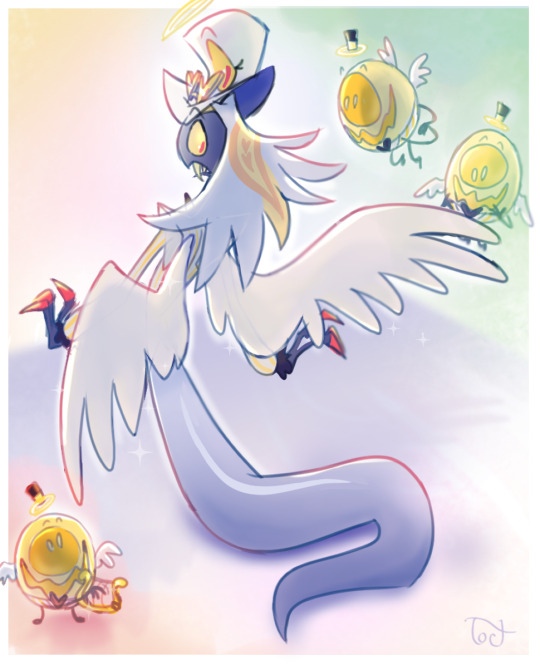
Thinking about his wings
#he definitely has them#I wonder what he thinks of his new form (I imagine he digs it)#also wanted to try designing the egg bois#they hatched out of their shells like little hardboiled yolks and egg whites#but also golden egg motif#and top hat halos#I had so much fun with this#hazbin hotel spoilers#hazbin hotel#sir pentious#hazbin hotel fanart#my art
6K notes
·
View notes
Text
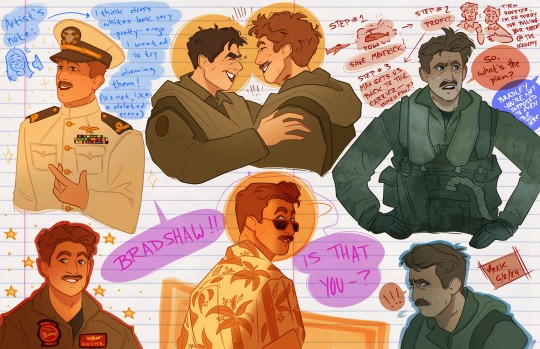
Rooster sketches 2: Electric boogalo: the Roostering.jpeg
Also, this is what my sketchbook pages used to look like when I drew traditionally, so this made me really happy :)
#bradley rooster bradshaw#bradley bradshaw#top gun rooster#top gun maverick#top gun maverick fanart#top gun#tgm#miles teller#art#digitalart#illustration#artists on tumblr#csp#clip studio paint#the other weekend we lost power and references for these were in a csp file so i thought okay lets go#I LOVE HOW THIS TURNED OUT#also#the voices: draw him in dress whites#me: at once my liege you are SO right#maverick#pete mitchell#tom cruise#mmm i forget i LOVE to draw little golden saint halos around people#it's like a reward
451 notes
·
View notes
Text
listen i know people love the “ghost wears a mask because he has so many scars” headcanon or the “ghost wears a mask because of trauma” headcanon and so do i but i’m also a “ghost wears a mask because he’s so pretty, his face belongs on the body of a cherub, and people don’t take him seriously without the mask” believer and nothing can change my mind
#motherfucker takes off his mask and it’s like he has a halo suddenly#like he’s bathed in golden light and no one knows where the fuck it’s from#then he opens his mouth and everyone kind of shakes themselves out of the trance they were in#modern warfare#ghost#simon ghost riley
474 notes
·
View notes
Text

Stephanie Rew, "The Alchemist", oil, egg tempera and 24ct gold leaf on panel. B, 1971, Scottish painter based in Edinburgh, UK.
#stephanie rew#the alchemist#oil egg tempera and 24ct gold leaf on panel#oil#oil painting#egg tempera#24ct gold leaf#gold leaf#mix media#painting#art#scottish artist#gold#golden#lace#black#dress#woman#portrait#labyrinth#halo#Alchemist#head#realism#imaginative realism#figurative art#contemporary art
172 notes
·
View notes
Text









character requests wrap up
thank you all these were so much fun!
#i wanted the styles to be more uniform but there they be#for the character requests#my art#halo#master chief#pablo schreiber#golden kamuy#rikimatsu ariko#ipopte#the crow#eric draven#disa#dragon's dogma 2#cirilla of cintra#the witcher#devil may cry#dmc#gloria#fortune#mgs#metal gear solid#mifune toshiro#tsubaki sanjuro#john seed#far cry 5#fc5#ciri
264 notes
·
View notes
Text
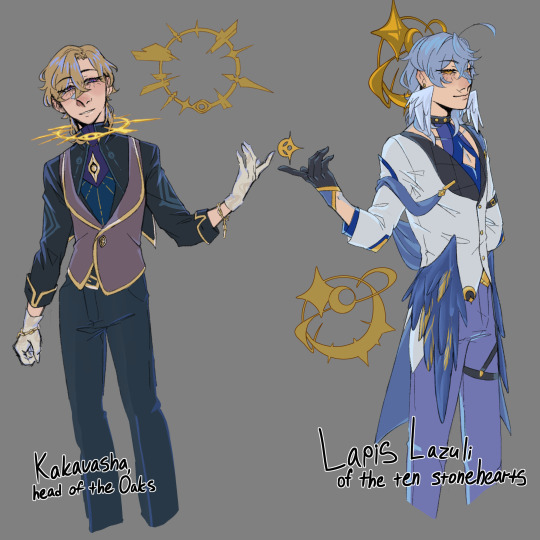

Role swap AU designs (and some minor details about them) inspired by this post right here that got me brainrotting for the past five hours.
#Highly suggest you check the sourse to get a grasp of the ideas#Speaking of! In this AU Kakavasha sees no difference between the Harmony and the Order#Because he only really believes in his own culture's deity and Gaiathra seems like a combination of both to him#That being said since he's the one with the trial of harmony inflicting powers in this universe he calls upon his deity when he chants#Also the halo thing with spikes around his neck is Gopher Wood's doing#Like he was looking for a halovian child to inflict the Order upon the people right? so he's upset Kakavasha is not halovian#Even though he quite literally has Ena's eyes. Gopher has to push his halo supremacy agenda somehow#As for Lazuli#He and Robin barely survived the Stellaron crisis and their close proximity to it affected them#He gets golden feathers and Stellaron shaped halo. Robin gets bedridden and unable to survive without the IPC#So they basically hold her hostage to keep him as their loyal guard dog#hsr aventurine#sunday hsr#sunday x aventurine#honkai: star rail#hsr#sunturine#avenday#honkai star rail#hsr redesign#except this one is lazy
288 notes
·
View notes
Text
Gay subtext is so much funnier than gay text because in the process of reading Babel you quickly come to realize that Robin only ever gives detailed physical descriptions of men
#babel Rf kuang#robin: he was a very handsome man#robin: he had a beard and his face was like this and his mannerisms were like that#robin: stares in awe of ramy being haloed by golden sunlight#me only realizing letty was blonde bc of the fanart i just looked at:
271 notes
·
View notes
Text
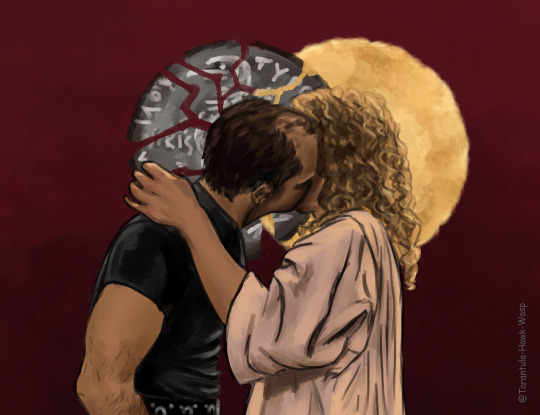

judas, must you betray me with a kiss? happy easter with some jesus christ superstar 2000 redraws
#my art#artists on tumblr#artwork#easter#jesus christ superstar#jesus christ superstar 2000#jcs 2000#jcs#jesus x judas#jesus christ#behind judas is a tyrian shekel which was probably the silver currency he got paid with#listen did i need to do a whole gold shattered background? no. does it detract? maybe. I dont care i was put on this earth to draw halos#and radiating lines and gilt backgrounds ok#jcs 2000 can have blond jesus rights bc hes pretty and they make his hair soooo golden in the lighting like a halo almost#i did a version with the haloes for the second one but it was too visually busy around their heads
282 notes
·
View notes
Text



Yea i finished the cheese kingdom howd u guess
#i think smoked cheese and gold cheese cookies are c4c (cheese4cheese) bc why not#my art#procreate#cookie run#cookie run kingdom#crk#golden cheese cookie#smoked cheese cookie#mozzarella cookie#worst polycule ever#nightmare blunt rotation and mozzarella cookie#golden cheese kingdom#cr#i forgot golden cheese’s wings but um its ok she put them down. for a second.#mozzarella lowkey lookim like a homestuck w her halo
39 notes
·
View notes
Text



Arcane Herald and Machine herald (acrylic on canvas)
#Arcane#viktor arcane#Arcane herald#Machine herald#Arcane spoilers#league of legends#my art#fanart#Yes I hung them up right away. I'm very proud and it was super fun#The paints and stuff I used were OLD as hell I've had those for a decade#I'm super happy they still worked as well as they did tjo#Now I'm almost out of White paint#I feel like buying golden paint and painting the Arcane Herald in the astral plane#W the claw halo. That could be cool as well#Olisephart
41 notes
·
View notes
Photo

Bonita Soleil
One of my favorite character looks in Psychonaugts 1, I like her level too...kinda, I like the meaning behind it, and the self criticism and you know loosing your muse and all that...playing it on the other hand...not one I enjoy. But I love Bonita Soleil I love her look, I love the aesthetic, and I wanted to draw her and...yes I did a semi Virgin Mary/saintly look I think it works a lot...can't wait for those types to complain about me being sacrilegious and a dirty sinner, and how jesus saves. -sips coffee- I can handle it don't panic.
#artists on tumblr#digital art#small artist#art#artist#bonita soleil#psychonauts#sun#bright#light#halo#beautiful#heavenly#shining#muse#pretty#stylized#actress#sunny#gloria's theater#glowing#yellow#orange#golden#psychonaut#video game#gaming#fanart#gaming fanart#psyschonaut fanart
66 notes
·
View notes
Text

XBox.com (2004)
#Xbox#Spyro#halo#microsoft#y2k#2000s#2000s nostalgia#2000s style#2000s kids#y2k nostalgia#2000#00s#golden eye#halo 2
272 notes
·
View notes
Text






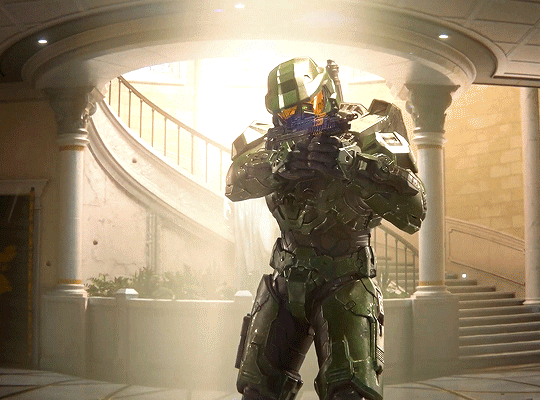
Rainbow Six Siege: Elite Sledge Halo Crossover (×)
#r6s#rainbow six siege#sledge#halo#r6sjay#edits*#gifs*#master chief#creatormari#userlivvi#gamingedit#dailyvideogames#dailygaming#gamingnetwork#fpsource#this looks soooo good man...#do i get a golden pony with it why is it so freaking expensive#and i dont play the game anymore#so ill just admire it from afar#aaaand i forgot to watermark it :)
230 notes
·
View notes
Text

this comment, alone, has made me write 15k words of daforge since i saw it. thank you fic commenters ilysm
35 notes
·
View notes
Text
Wen'Girehk

Guys look its my "actually present" parent and "came back with the milk" dad.
#ryn's bs#redacted audio#redacted asmr#digital art#art#oc art#redacted wen'alak#redacted g'girehk#redacted sovereigns#g'girehk may or may not have actually been based of my dad#my parental issues are strong with this one#fatherless and motherless behaviour#gold jewellery bc wen'alak's halo is golden#didnt know what colour to give g'girehk so i just settled with blue#is it a bad time to say i dont know how to draw beards?#or wrinkles?
15 notes
·
View notes